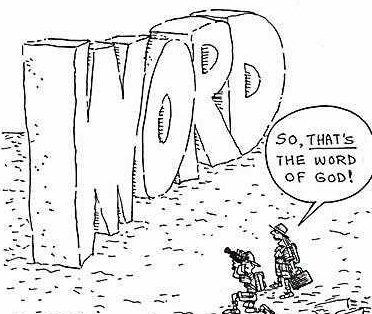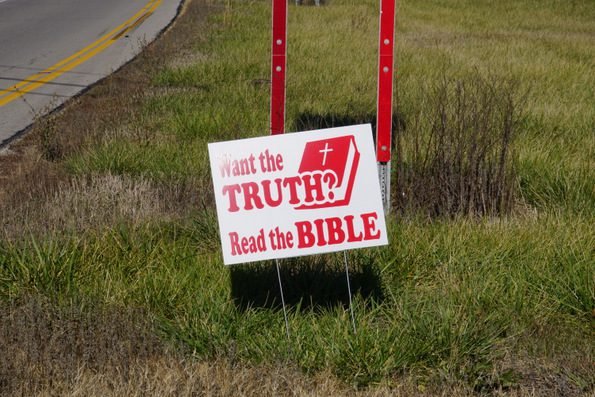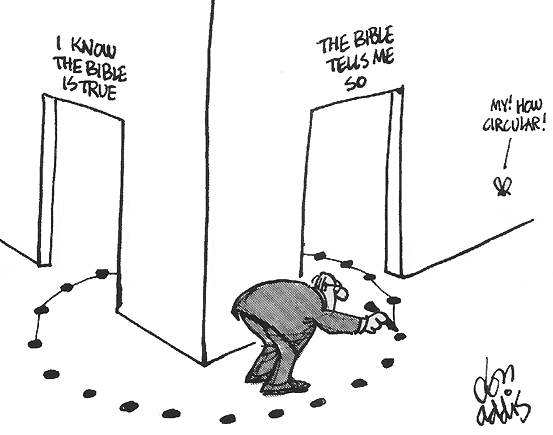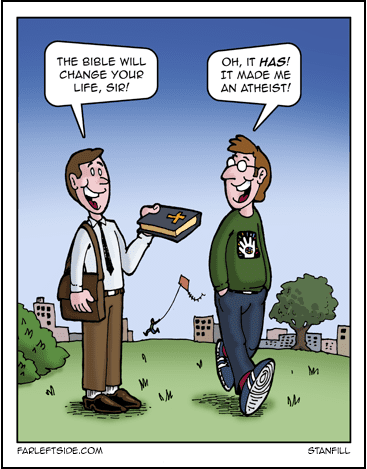
Several years ago, an atheist/agnostic reader sent me the following questions:
- As an atheist, do you still read/think about the Bible’s literary or symbolic meaning, or have you had enough of it in your life?
- Have you become hardened/cynical to the point where you can’t approach the Bible with a sense of wonder as I do?
- Do you have any passages that still inspire you, engage your mind, and move you in any way?
- And lastly, do you ever feel like fundamentalism is responsible for turning people away from stories and poetry that would otherwise be valuable to hear?
Bruce, do you still read/think about the Bible’s literary or symbolic meaning, or have you had enough of it in your life?
From ages fifteen to fifty, I was a devoted follower of Jesus. Reading and studying the Bible was a part of my daily routine. I read it from cover to cover numerous times. As a pastor for twenty-five years, I immersed myself in the teachings of the Bible. Few days went by when I hadn’t intellectually and devotionally read and studied the Bible. I also read scores of theological tomes as I prepared one of the thousands of sermons I preached on Sundays and Thursdays. I had a good grasp and understanding of the inspired, inerrant, infallible Word of God. When people sat before me on the Lord’s Day, they expected to hear me preach from the Bible. I did my best to provide congregants with well-studied, well-thought-out sermons. I despised then, and still do to this day, lazy preachers who have plenty of time for golf, preachers’ meetings, and dinner at the buffet, but no time to prepare their sermons. I’ve heard numerous pastors deliver incoherent, contradictory, rabbit-trail sermons. Awful stuff. I couldn’t imagine sitting in church week after week listening to such drivel.
All of this changed, of course, when I left the ministry in 2005 and left Christianity in 2008. Over the past seventeen years, I have not picked up the Bible just to read it. I still have my KJV preaching Bible, but it collects dust on the bookshelf. My mind is crammed with Bible verses and theology, so when it comes to writing posts for this site, I don’t need to consult my Bible. I will, on occasion, use the Bible Gateway or the E-sword Bible Study Program if I can’t remember something. As you might know, I have memory problems. Usually, it’s newer stuff I have a hard time remembering. The Bible and Christian theology lie safely buried in my long-term memory, whether I want it to be, or not. I may not remember what I did an hour ago, but I can remember a sermon I preached years ago.
Have I had enough of the Bible? The short answer is yes. Evangelicals love to tell people that the Bible is a “special” book; that it is an inexhaustible book; that every time you read the Bible it teaches you something new. Nonsense. Poppycock. Bullshit. The Bible is no different from any other book. It can be read and understood by atheists and Evangelicals alike. You can diligently and thoroughly read the Bible, so much so that you have mastered the text. Don’t let all the college training that preachers receive fool you. These men aren’t sitting in classes day and night immersing themselves in the Biblical text. In fact, Bible colleges and universities don’t comprehensively teach prospective pastors the Bible (and Bible “survey” classes don’t count). I learned far more about the Bible in my study than I ever did in college.
Do I know everything there is to know about the Bible? Of course not. That said, I have read and studied the Bible enough that I am confident that I know the text well. “But, Bruce, people disagree with you all the time about what the Bible says.” Such disagreements aren’t from a lack of knowledge. These skirmishes come as a result of the divisive, sectarian nature of religion in general, and Christianity in particular. There are thousands of Christian sects, each believing that their interpretation of the Bible is correct. That my interpretations differ from those of others is to be expected. Who is right, and who is wrong? Beats me. That’s what makes the Bible so awesome. You can make it say virtually anything. Homosexuality is a sin — no, it’s not. Abortion is murder — no, it’s not. Women can be pastors — no, they can’t. Baptism is by immersion — no, it’s not. Sinners must repent over their sins to be saved — no, they don’t. Baptism is required for salvation — no, it’s not. The universe is 6,028 years old — no, it’s not. Jesus died on Friday — no, he didn’t. Jesus went to Hell when he died — no, he didn’t. Divorce is a sin — no, it isn’t. True Christians speak in tongues — no, they don’t. Shall I go on? The disagreements are legion.
Bruce, have you become hardened/cynical to the point where you can’t approach the Bible with a sense of wonder as I do?
The Bible is a YMMV book — your mileage may vary. I don’t believe I am hardened or cynical when it comes to the Bible. I approach the Bible as I would any other book. I can’t say that I have approached any book with a sense of wonder. I have, however, read a few books throughout my life, which, when finished, made me conclude: this book is an awesome book, one that I would read again. Few books are worth reading once, let alone twice. Is the Bible really that much better than any other book ever written? I think not. I have a few favorite authors all or most of whose books I have read. Bart Ehrman, Thomas Merton, James Michener, and Wendell Berry come to mind. Over the years, I have read thousands of books, most of them one time. That I have read the Bible over and over and over again doesn’t mean that I think it is a New York Times bestseller — a book that should be frequently re-read. I read the Bible as often as I did because doing so was an essential part of my job. I also did so because my pastors and teachers repeatedly told me that one of the signs of a good Christian was how much time he spent reading and studying the Bible. I really wanted to be a good Christian, so I devoted myself to reading and understanding the King James Version of the Holy Bible. Only in religion do we think such excess is normal. If I spent hours a day, for decades, studying the Harry Potter books, I doubt anyone would think such behavior is healthy.
Bruce, do you have any passages that still inspire you, engage your mind, and move you in any way?
I still love and appreciate the Sermon on the Mount (Matthew 5-7), Ecclesiastes, Proverbs, and some of the Psalms. Do these Bible verses inspire me, move me, or engage my mind? Not really. I am at a different place in life. Due to declining health, I no longer read as much as I used to. Sadly, I have gone from being a War and Peace reader to being a magazine reader. I am fatigued and in pain every day, so once I have done my writing for the day, I typically don’t have much time left for reading. I “want” to read, but alas, although my spirit is willing, my flesh is weak. If and when I have time to read, I don’t want to spend it reading an ancient religious text I have read countless times before. Simply put, I just don’t find the Bible all that interesting these days.
Bruce, do you ever feel like fundamentalism is responsible for turning people away from stories and poetry that would otherwise be valuable to hear?
Whether what the Bible says is “valuable to hear” varies from person to person. Most Christians don’t even read the Bible through once, let alone numerous times. That’s why devotionals such as “Our Daily Bread” are so popular. These publications are easy to read, taking only a few minutes a day. Reading them allows Christians to feel as if they have “read” the Bible and “communed” with God. Pablum for nursing babies, perhaps, but not meat that comes from devoting oneself to reading and studying the Bible. Bible illiteracy is common, even among Evangelicals — people who generally say that they are “people of the Book.”
I am of the opinion that fundamentalism is a problem wherever it is found. Fundamentalism is not only intellectually stultifying, it can and does cause psychological and social damage. In some instances, it can even cause physical harm and death. As a writer, my target is primarily Evangelical Christianity — which is inherently Fundamentalist. (Please see Are Evangelicals Fundamentalists?) I know firsthand the harm caused by Evangelical beliefs and practices. It will be a good day when Evangelicalism draws its last breath. I will dead by then, but maybe, just maybe one of my grandchildren or their children will be alive when Fundamentalism goes whimpering into the night, never to be seen again. I make no apology for working towards the demise of Evangelicalism. As far as non-Evangelical Christianity is concerned? Meh, I don’t really care one way or the other. I am an atheist, not an anti-theist. Not all religions are the same. Some are benign and innocuous; others ravage the mind and cause untold damage to our culture. To the former I say, “live and let live.” To the latter? “Bring me a flamethrower.”
Bruce Gerencser, 68, lives in rural Northwest Ohio with his wife of 47 years. He and his wife have six grown children and sixteen grandchildren. Bruce pastored Evangelical churches for twenty-five years in Ohio, Texas, and Michigan. Bruce left the ministry in 2005, and in 2008 he left Christianity. Bruce is now a humanist and an atheist.
Your comments are welcome and appreciated. All first-time comments are moderated. Please read the commenting rules before commenting.
You can email Bruce via the Contact Form.











